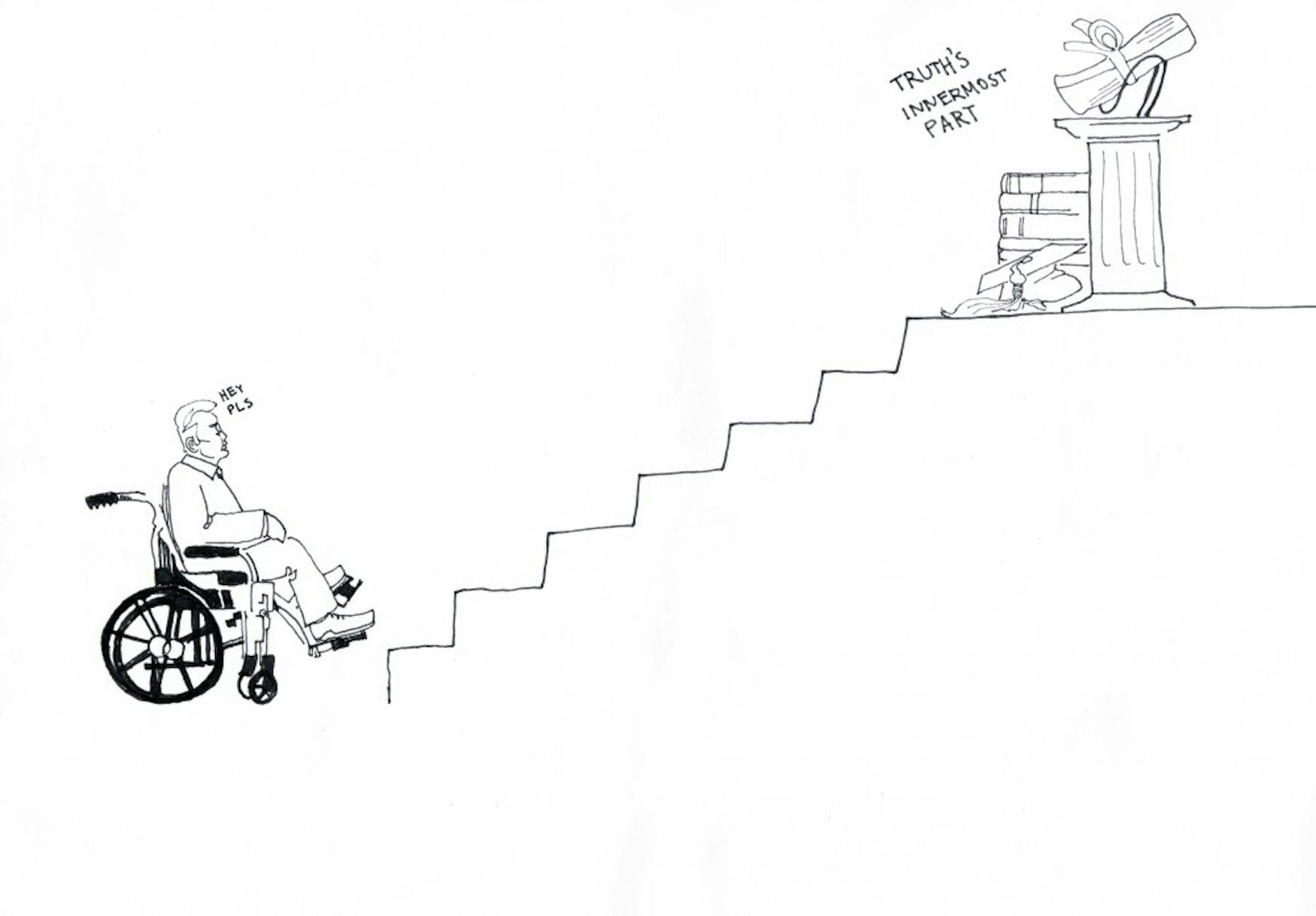EDITORIAL: Accessibility issues on campus need to be adressed
In Brandeis' mission statement, the University expresses hope that students graduate "deeply concerned about the welfare of others." Unfortunately, the University itself has failed to model that concern. A student-run advocacy group called Addressing Accessibility at Brandeis reached out to University President Ron Liebowitz in an open letter last Thursday, expressing that they are "baffled" at how Brandeis can be "so exclusive of those with disabilities." Addressing Advocacy at Brandeis requests that the University discuss accessibility at Brandeis through an open forum. This board commends these students' efforts, urges the University to hold the requested forum and has additional suggestions for improving accessibility on campus.
Along with the letter, Addressing Accessibility emailed Liebowitz a series of personal accounts from members of the Disability community at Brandeis. Given the breadth of the accessibility problems on this campus — administrative, academic, physical — we call on every member of the Brandeis faculty and staff to read these accounts and attend the open forum. Everyone on campus can learn from this discussion.
Many universities have taken steps to improve accessibility on their campuses. The University of Michigan has a computing center for students with disabilities, complete with specialized hardware, video magnifiers and speech-recognition software, per their website. Northeastern University holds five sessions of "transitional tutoring" that guide students through their Disability Resource Center, per collegechoice.net. Additionally, many schools' disability services websites contain clearly labeled portals to filling out forms and requesting services. We suggest that the University look to other schools' efforts to implement cutting-edge services for students with disabilities and consider how similar changes can be made at Brandeis.
There are additional Brandeis-specific changes that should be implemented. The Health Center is one of the most difficult places to reach on campus for those with limited mobility, and the BranVan does not stop directly at the entrance. We suggest creating a service to bring students from the nearby BranVan stop at Stoneman. Additionally, one student account mentioned wheelchair ramps to buildings being blocked by overgrown bushes. These issues are easily fixable, and we hope the University will do so promptly.
In their accounts, students also cited frequent miscommunications and negative experiences with administrators responsible for helping with accommodations. One student was never reached out to by Student Accessibilities Support Office after their advisor left, and the student's requests for a meeting with the office were not answered. One student was even told by an Accommodations counselor "to give up on college because [they] were incapable of finishing." This oversight and hostility should not be occurring. They can be solved through administrative training, more staff, drop-in hours at the Health Center and Disability Services and better communication between administrators and students in need. The University and administration should be as accessible as possible — right now, the departments responsible for providing services are just an additional barrier.
Professors also need to acknowledge student concerns and adopt an ethos of proactive accessibility. In their personal accounts, multiple students said that professors ignored their need for large-print materials and failed to use microphones in large lecture classes. Additionally, one professor failed to provide an alternative to a multiple choice exam for a student with severe dyslexia. University professors need to be proactive in working with students with disabilities — these changes require nothing but caring.
In his Framework for the Future, Liebowitz said he hopes to renovate campus infrastructure to “place students at the center” and “promote collaboration.” Currently, many dormitories and academic buildings are inaccessible to students in wheelchairs, and the many hills and stairs provide barriers to students who experience chronic fatigue. As the University plans renovations, we urge it to prioritize accessibility on campus.
Liebowitz hopes to “allocate institutional resources” to meet specific goals, including enhancing the student experience, per the Framework’s website. Fewer than 35 percent of students with disabilities" at four-year colleges graduate within eight years, according to a Nov. 11, 2017 article in the Hechering Report. To really enhance the student experience, the University must consider the experience of all Brandeis students — particularly those with the greatest needs.



Please note All comments are eligible for publication in The Justice.